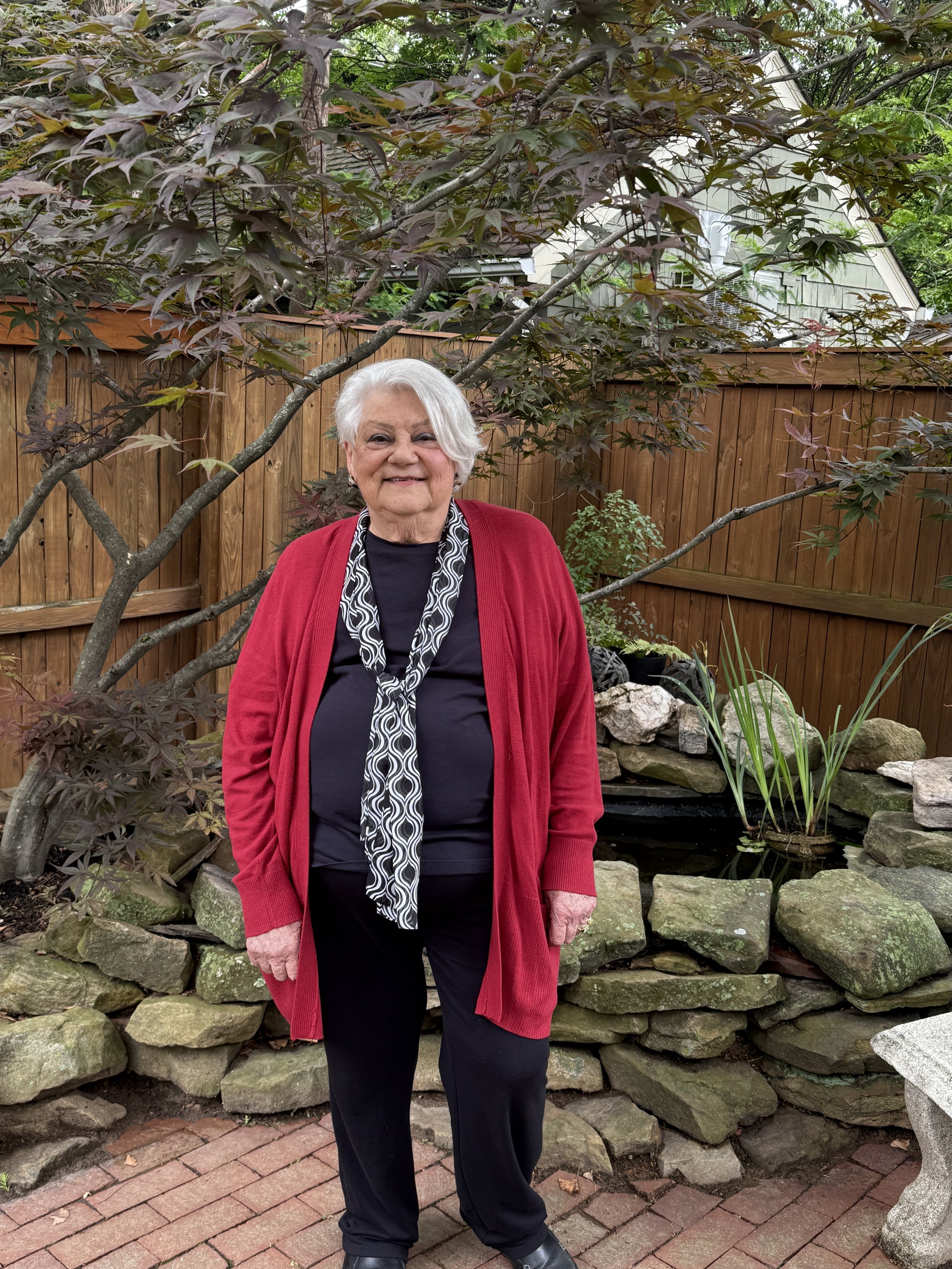Serendipity in Silk: How Station Stitchers Found a Home for Eight Bins of Obi
Spotlight
A charming mistake on a set of vintage Sunbonnet Sue blocks sparked Rickie's lifelong love of quilting—and led to the creation of Frost Antiques, where she and her husband share curated textiles and quilt kits nationwide. Her unique eye for Japanese fabrics and antique quilts has drawn a loyal following, inspiring connections through history, craft, and community. A chance donation of Obi fabric became the beginning of a powerful partnership with Station Stitchers, proving that sometimes, the greatest gift is in the giving.
by Lynn Lothman
Station Stitchers, the Purcellville-based organization that creates and donates charity quilts, is often blessed with fabric donations. These usually come from quilters who are downsizing, stepping away from the craft, or simply looking to give their stash a second life. Donors know that their fabric will be used with love and purpose.
But one year, something truly unexpected arrived: Eight boxes and bins of Japanese Obi.
What’s an Obi?
An Obi (pronounced Oh-bee) is a long sash, 10–15 feet in length and about 14 inches wide, traditionally used to wrap around the body to keep a Kimono or Yukata closed, much like a decorative belt. Some Obi are simple and utilitarian, made of cotton or hemp. Others are exquisite brocaded silks, often embroidered with tiny, meaningful details, used in formal ceremonies or as treasured heirlooms. Because of their history and craftsmanship, many Obi are highly collectible.
So the question was:
What do you do with eight bins of Obi? Where do you even start to determine their value?
A Chance Meeting That Was Meant to Be
Some would call what happened next dumb luck.
But we call it something better: serendipity.
On a drizzly afternoon, Station Stitchers volunteers Nicki, Nancy, and I visited the Arlington home of a woman whose name had been shared through a single business card.
Despite the gloomy weather, her garden was breathtaking—a tranquil, perennial oasis that felt like stepping into a Japanese landscape. Inside, her home was a curated treasure chest, echoing centuries of Japanese culture through textiles, prints, and antiques.
We had found the perfect person:
Enrica “Rickie” Frost.
Meet Enrica “Rickie” Frost. Rickie was born in Rome, Italy, and moved to the U.S. at age 12 with her mother on a diplomatic visa. Settling in the D.C. area, she became captivated by a neighbor’s home filled with Japanese antiques—a retired Navy Captain who had served in Japan.
“It was magnificent! I had an appreciation for the designs that was unusual for a 12-year-old,” she said. “I had a curious mind and wanted to know how it was made.”
Years later, she and her husband completed two tours of duty in Japan—first in the late 1960s and again in the 1980s—while he served with Naval Intelligence. During the 1980s, as Western clothing began to replace traditional Kimono in daily life, Japanese shrine sales (flea markets) were flooded with vintage garments. Rickie saw an opportunity—and a calling.
She began collecting Obi, Kimono, and other textiles, while her husband collected Samurai swords, knives, and medals. Their shared passion grew into a deep exploration of Japanese traditions, rituals, and history.
“There is a story in everything in our home,” she told us.
From Sunbonnet Sue to Frost Antiques
Rickie’s quilting story began when her mother-in-law found a trunk of unfinished “Sunbonnet Sue” quilt blocks—with the sun hats sewn on backward! The charming mistake delighted Rickie, and she finished the quilt. From there, her love of quilting took off.
When her husband retired after 30 years in the Navy, they combined their interests to form Frost Antiques (www.frostantiques.us)
Instead of opening a storefront, they traveled to antique shows across the country, offering curated textiles, historic objects, and quilt kits made from Rickie’s personal stash of Japanese fabrics.
Her work caught the attention of quilters and collectors alike, and she developed a loyal following, many of whom became dear friends. Today, Rickie continues to lecture, present, and share from her collections, which include:
19th-century American quilts
Antique Japanese Kimono and Obi
Vintage Yukata cottons
Rare Japanese artifacts and textiles
The Gift That Kept Giving
So, what happened to those eight bins of Obi?
After that one fateful call, Rickie volunteered to sell the Obi at her shows—and donated half the proceeds back to Station Stitchers. It was a perfect partnership. A relationship built not just on fabric, but on shared values, generosity, and storytelling.
On Station Stitchers and the Power of Giving
When I asked Rickie what she thought about Station Stitchers and volunteering, she paused, then offered this:
“Station Stitchers is a friendly, prolific community that is generous in sharing its skills and creativity with those less fortunate. Share what you have, I say—spread the wealth.
Sometimes the rewards of giving are greater for the giver than the recipient. The process of giving creates a community... it brings people together with others who share similar values and a real passion for what they love to do.”
And that’s exactly what happened. A donation. A connection. A story stitched together, across time, cultures, and generations.





